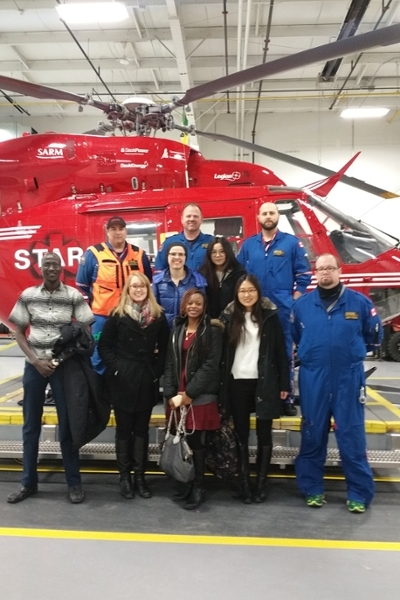
STARS Tour
Lisa Jane de Gara is a MPA student from the University of Saskatchewan campus, and a 2015 Intern at the Ministry of Education.
By Lisa Jane de Gara, MPA student and executive intern
All JSGS internship events are enriching, but I’m going to come out and declare a favourite, because so far only one of them has allowed me to sit in a helicopter. This week, a number of the JSGS interns had the pleasure of visiting the STARS Air Ambulance base in Regina.
STARS is a policy innovation borne of geographic necessity. As anyone who’s ever driven Saskatchewan’s highways will tell you, there are long stretches of this province which are marked mostly by their emptiness. If something goes wrong twenty minutes’ drive from Rosetown, SK (population 2,277) how can you possibly get to care in time? For a long time, the answer was “you can’t.” In medical contexts where seconds count—trauma, sepsis, labour complications—sometimes ground ambulances cannot arrive quickly enough.
This is where STARS comes in. Dispatched from Saskatoon and Regina, the helicopters travel at hundreds of kilometers an hour and can land almost anywhere. Inside, their highly-trained medical team stabilizes the patient and delivers them to a tertiary hospital for further care. From the reception of an emergency call until the team’s helicopter departure: a blistering eight minutes. To think some people complain about how slow healthcare is in this country.
The cost savings to the public health sector are enormous, as timely treatment of strokes and brain injuries can save more than $1 million per patient. But it’s not just sector efficiency that’s at stake: their lobby prominently features a framed photo of a newborn with a tiny model helicopter—a life that would have ended before it began, were it not for the speed and effectiveness of STARS.
Public policy is best when it is nimble, adaptable, and innovative. Being able to see such a policy in action was a real honour.

